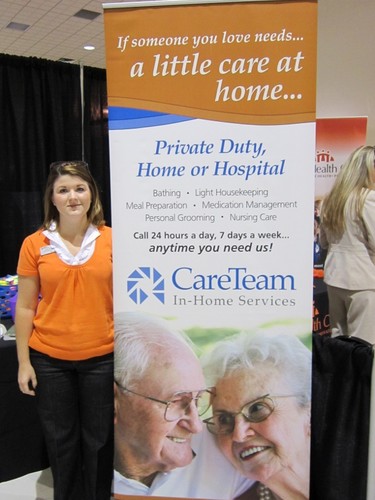Enid Senior Expo a Hit!

With 80 vendors, food, games, and information, the Enid “Prime Timers” Senior Expo was a hit. CareTeam stole the show with our PLINKO board game! Drop in a token at the top, and watch it bounce around before landing at a prize!
See original posting here.
Newest Oklahoma Location Now Open!
As the economy has continued to lag, we have noticed that caregiver costs are still on the rise. With gas prices so high, we have always made efforts to keep our caregivers on cases that are nearby to them, and to avoid having them drive long distances to provide care or to turn in their paperwork.
In 2011, we analyzed where our caregivers are coming from and found that a good majority live in the northern Oklahoma City area. Likewise, many of our clients are in Oklahoma City proper as well. With this data, it was clear: we needed to move closert to our customer and caregiver base!
Having looked all around the northwest area of the city, we found a perfect location with easy access to several main thoroughfares. As of August, 2011, we were open for business at 6404-B Santa Fe, just one block off the Broadway Extension and NW 63rd intersection.
If you’re in the neighborhood, we’d love to have you stop by and see our new office space. We have maintained our western “Cowboy and Indian” antique theme, but now have a pleasant, shady cove in a really neat office park. We’re open M-F, 8-5. So drop by and say “hello”, or come in to apply to be one of the best caregivers in Oklahoma!
AARP Finds Toll On Family Caregivers Is ‘Huge’
That’s a good deal for society. But for the family members doing the work, the study finds they need a lot more help.
Take Cymando Henley, 36, whose mother was diagnosed with multiple sclerosis when he was starting college. She’s now wheelchair bound, and Henley has been taking care of her for nearly two decades.
Henley does have help. Montgomery County, Md., where they live, and the MS Society, pay for a combined 35 hours of home health aides each week — though that’s threatened by budget cuts.
But every day, Henley must help his mom in and out of bed and onto the toilet. He even rolls her over in the middle of the night if she becomes uncomfortable. Care like this from a professional can cost tens of thousands of dollars a year. But Henley does it for free, and it’s on top of his full-time job. The AARP study finds family members spend an average 20 hours a week providing care. Henley refuses to count, but his mom, Vicki, keeps tab.
“Cymando’s care for me was about 40 hours a week,” she says.
‘The Burden On Families Is Huge’
Modern medicine now allows people to manage chronic conditions for decades. But the AARP study finds increasingly complicated procedures are routinely expected of family caregivers. Henley remembers one time his mom was being discharged from the hospital. She had a catheter in, and the nurse said, ‘Oh, we’ll call and tell you how to take it out over the phone.’
Lynn Feinberg, who co-authored the AARP study, says modern family caregiving is incredibly stressful.
“The burden on families is huge,” Feinberg says. “While families are stepping up to the plate and make this contribution to society, the costs to their own health and financial security is huge.”
The study finds those who cut back work lose hundreds of thousands of dollars in income over a lifetime. Feinberg says caregivers are also more prone to depression, physical ailments and social isolation.
“They will burn out, they will get sick and there will be no other option but to place someone in a nursing home, which is what nobody wants,” Feinberg says.
New Solutions
“Boomers have fewer kids than their parents did, and they’re working, and they don’t necessarily live around the corner anymore,” Mintz says.
On top of this, there’s a shortage of paid home health aides. Last week, the Obama administration joined labor groups calling for the creation of two million more jobs in home health care, plus a new visa for immigrants willing to enter the field.
Mintz has grappled with the problem in caring for her husband, who has multiple sclerosis. Earlier this year she had trouble finding someone to change his catheter twice a week while she was at work. So she says she resorted to something a little crazy.
“With Steven’s permission, I actually put a note on the neighborhood Listserv,” she says.
Sure enough, a man who works from home said he’d be willing to try it. He’s been doing it ever since — for free.
Mintz says we need to expand our definition of “family.” Next year, she plans to launch a recruitment drive to match those in need with volunteers.
“It might be, ‘I can drive her to PT for the next five Thursdays,’ or ‘I can bring meals for the next six months,'” Mintz says.
In other words, create a community of caregivers — an old idea for a new age.
See this article in its original form, and read more at www.npr.org